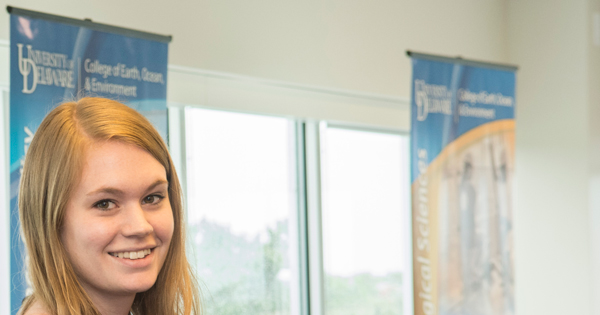


Washington-bound
Photo by Doug Baker and inset photo courtesy of Meredith Kurz January 11, 2018
Delaware Sea Grant selects marine policy student for prestigious Knauss Fellowship
Graduate student Meredith Kurz arrived at University of Delaware in 2015 to study marine policy because she “wanted to be directly involved in the policymaking associated with the sustainable management of our ocean and coasts,” especially as it relates to climate change mitigation and adaptation.
Growing up, Kurz had always imagined she would become a marine biologist but as an undergraduate student she realized that her greatest passion was at the intersection of research and policy.
“I became convinced that the best way to position myself to affect our country’s relationship with the ocean and coasts was to build interdisciplinary knowledge including science, policy and economics,” she said.

Beginning Feb. 1, Kurz will use the knowledge she’s gained at UD to work as a 2018 Knauss Fellow within the Ocean Acidification Program at the National Oceanic and Atmospheric Administration’s (NOAA) Office of Oceanic and Atmospheric Research.
The National Sea Grant College Program and NOAA sponsor the Dean John A. Knauss Marine Policy Fellowship program, which provides a unique educational and career development experience to students interested in the national policy decisions that affect ocean, coastal and Great Lakes resources.
Graduate students apply through Delaware Sea Grant and other states’ Sea Grant programs, and qualified applicants are matched with various agencies in the legislative and executive branches of the federal government for paid assignments.
As a Knauss Fellow, Kurz will support the work of the Global Ocean Acidification Observing Network (GOA-ON) by coordinating the efforts of the research scientists and policy experts within the member network. GOA-ON investigates the impacts of ocean acidification on global marine ecosystems, as well as methods to mitigate those effects and adapt natural resources to a more acidic environment.
Kurz called the Knauss Fellowship “the best possible chance to be exposed to national level marine policy” and a positive step toward her ultimate goal of working in national or international governance of the ocean.
“Accurate science, translated into workable policy terms and delivered to Congress, is vital to the preservation of oceans and the sustainable utilization of its resources,” she said. “This is exactly what I wanted out of the next step in my career.”
Creating a firm foundation
At UD, with funding from Delaware Sea Grant, Kurz worked with her advisor Professor George Parsons to evaluate the economic value of carbon storage in marshes, particularly in the Mid-Atlantic barrier island systems that run from the tip of Cape Henlopen, Delaware to the bottom of Virginia’s Eastern Shore. Preserving and nourishing the barrier islands that lie in front of the marshes is critical, Kurz explained, because marshes protect the environment by storing excess carbon from the atmosphere.
She also learned to translate marine science into working policy that applies research on a real-world basis through a project assisting Biliana Cicin-Sain, a professor in the School of Marine Science and Policy and director of the Gerard J. Mangone Center for Marine Policy, in developing and presenting a policy brief on applying ocean and climate science at the 2016 UN Climate Conference in Marrakesh.
These experiences, combined with Kurz’s interdisciplinary background in environmental science and training as a teacher (she spent two years teaching high school biology and environmental science in New Orleans before graduate school) made her an ideal applicant for the Knauss Fellowship program.
“The range of capabilities Meredith developed here at UD will be an asset to NOAA’s Ocean Acidification office,” said Jennifer Merrill, DESG research manager. “She is well-prepared for the critical work she is about to undertake and we look forward to watching her career develop.”
Since 1979, Delaware Sea Grant has sent more than 37 Knauss Fellows to Washington, D.C. Kurz, who completed her master of marine policy at UD in 2017, is among 61 finalists selected from 24 separate Sea Grant programs for the 2018 fellowship program.
Applications for the 2019 Knauss Fellowship are being accepted until Feb. 23. To learn more about applying for this or other Sea Grant fellowships, visit the Delaware Sea Grant website.
About Delaware Sea Grant
The University of Delaware was designated as the nation’s ninth Sea Grant College in 1976 to promote the wise use, conservation and management of marine and coastal resources through high-quality research, education and outreach activities that serve the public and the environment.
UD’s College of Earth, Ocean, and Environment administers the program, which conducts research in priority areas ranging from aquaculture to coastal hazards.
Contact Us
Have a UDaily story idea?
Contact us at ocm@udel.edu
Members of the press
Contact us at 302-831-NEWS or visit the Media Relations website

